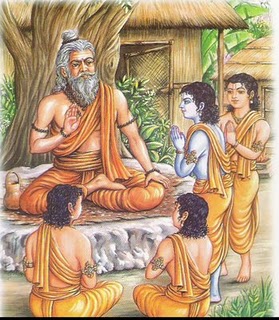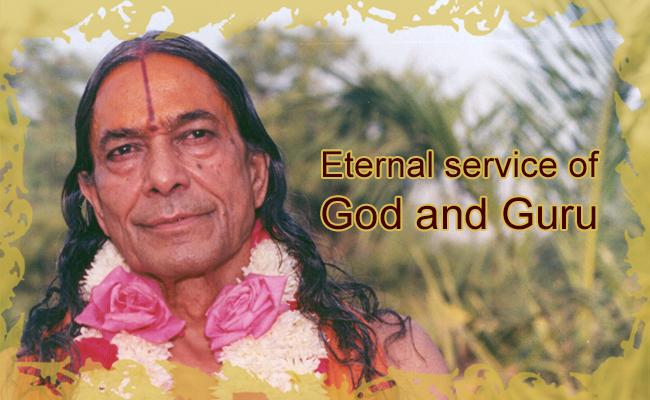|
|
JKYog
e-Magazine, Issue No. 80
|
|
|
Editor's Message Dear Readers,
In the US, this year, April 23 - 29, is recognized as
National Volunteer Week. In light of that, the theme for April issue of
Sumiran is 'Seva' or 'Service.' We have previously understood that seva is to be done by tan (body,) mana (mind,) and dhan (wealth) so in this iss ue
we delve more deeply into this topic. In the first article, the meaning
of 'True Seva to God & Guru' is explained. From Maharajji's
lecture, we understand why we should ask for 'Eternal Seva of God &
Guru.' ue
we delve more deeply into this topic. In the first article, the meaning
of 'True Seva to God & Guru' is explained. From Maharajji's
lecture, we understand why we should ask for 'Eternal Seva of God &
Guru.'
We also share highlights from Swamiji's recent USA
tour. Further, in wellness for life section, we discover how our
body posture affects our physical and mental health. Finally, don't miss our BM contributions, and bhog recipe.
editor@jkyog.orgBest Wishes, Editor's Desk
|
|
|
|
सौ बातन की बात इक, धरु मुरलीधर ध्यान |
बढ़वहु सेवा-वासना, यह सौ ज्ञानन ज्ञान ||
sau bātana kī bāta ika,
dharu muralidhara dhyāna
baṛhavahu sevā-vāsanā,
yaha sau jñānana jñāna
The
essence of all the divine philosophies is to attach your mind with love
to Shree Krishna with a growing desire to serve Him. This is the
ultimate scriptural knowledge.
|
|
|
 |
 |
True Service to God and Guru
Vedic scriptures inform us that we are eternal servants of God. 500 years ago Chaitanya Mahaprabhu said the same thing: jīver svaroop hay kṛiṣhṇer nitya dās
 Meaning,
we are the eternal servants of Shree Krishna. However, what does it
mean to be a servant and to serve Krishna? As a servant, it means that
we should serve the Master on his terms, according to his wishes. If he
says, "Get me a cup of tea" in the middle of the night, we do it without
any grudges.
Shree Kripaluji Maharaj, in his couplet of Sadhana Karu Pyare, said:
unkāsukh hī chahuṁ niśhi din, sukh na nij chahu pyāre
unakī ichchhā meṁ hī apanī, rākhu ichchhā pyāre
"Desire only His happiness; do not desire your own.
Desire only that which is pleasing to Him." Understand
that there are two aspects to loving God and Guru. The first is to
harbor loving sentiments towards Guru and God at all times. After all,
if God reciprocates all our sentiments as he always does, we don't want
him reciprocating the negative sentiments towards us! Additionally,
negative sentiments pave the way for the soul to keep rotating through
the 8.4 million species of life, which does not help us get to our goal
of selfless love. Second is the concept of sacrifice. Rupa Goswami, one of the disciples of Chaitanya Mahaprabhu, said: bhuktimuktispṛihā yāvat piśhāchī hṛidi vartate
tāvat bhaktisukhasyātra kathamabhyudayo bhavet
"So long as the two witches in the form of bhukti and mukti
reside in the heart of an individual soul, the Supreme Goddess of
Devotion cannot m anifest herself." This is because the root cause
of both bhukti and mukti is the desire for
self-happiness as explained below. Therefore, our ultimate goal is the
sacrifice of this desire; it should be replaced with the desire for Guru
and God's happiness alone. Bhukti is the desire to
enjoy material energy via the five senses: eyes (sight), ears (hear),
nose (smell), tongue (taste), and skin (touch). In other words, we like
to see beautiful things, hear nice words especially about ourselves,
smell good food or fragrances, taste well cooked food or sweets, and hug
our friends and family. All these symptoms are manifestations of our
desire for happiness. We all have heard the story of when God granted darshan
to Indra, and promised him a boon. As the king of the celestial gods,
Indra has all the material riches we typically hanker for-wealth, fame,
and power-that extend beyond our imagination. Yet, instead of asking for
divine love or eternal service, Indra asked for a woman, indicating the
desire for material happiness ( bhukti) is insatiable. This
desire for material happiness is not limited to the pleasures of the
earth planet-it extends to all the seven layers of heaven as well-all
the way up to Bhramalok. In other words, the desire for our happiness
exists in the entire realm that Maya rules. What happens beyond
that in the divine realm of Krishna that is above Maya? To comprehend
this, let's start by understanding the concept of mukti. Mukti
is the desire for liberation. In other words, freedom from the pain or
sorrow we experience during our sojourn on earth. This freedom or
liberation that we are seeking is also for our happiness! Since the
search for happiness stems from selfishness, its definition keeps on
changing and it takes on different forms. However, deeply embedded
within us is the knowledge that true happiness lies only in Krishna. So
now this selfish desire for liberation becomes redirected towards
Krishna in five subtle ways: Sālokya mukti is the desire to live in God's abodes Sārṣhṭi mukti is the desire to have the same opulence, wealth, and fame as God Sāroopya mukti is the desire to have the same form as God, i.e. to be as beautiful as him Sāmīpya mukti is the desire to be close to God as his personal aide And the worst of them all, also considered the queen by the jñānīs, is called sāyujya or kaivalya mukti.
This is where we desire to become one with Krishna by merging into Him.
When that happens, we eternally lose the opportunity to serve our Lord.
What a waste! This is why a wise devotee will always stay away
from liberation. If the desire for any form of liberation enters the
heart, it becomes all the more difficult to make the requisite sacrifice
due to the immense pleasure (selfish happiness) received from being so
close to Krishna. As we can see, the desire for self-happiness is
insatiable. It can be likened to a fire that keeps burning and never
dies. It may simmer down in one direction but will come back stronger
again, and again, and again. There is no end to these desires for our
happiness and it is precisely this sacrifice that ShyamSundar is seeking
before granting us divine, eternal bliss. The good news is that
these selfish desires, including the desires for happiness and
liberation, once redirected in the happiness and service of God and Guru
will lead us to eternal love. Thus, we should make it our goal to serve
God and Guru for their happiness alone. We can serve by volunteering
our time ( tan), mental service (service done in the mind or mana) or by donating wealth ( dhan). The typical rule of thumb is to donate 10% of our wealth and time in service of the Lord. The manasi seva, however, should be continuous.
|
 |
Why should one ask for Eternal service of God and Guru? 
This is an explanation of the first two lines of the keertan 'Nit Seva Mangu' by Shree Maharajji.
नित सेवा माँगूँ श्यामा श्याम तेरी,
न भुक्ति नाहीं मुक्ति माँगूँ मैं | nita sevā mañguṅ śhyāmā śhyām terī, na bhukti nāhīṅ mukti mañguṅ maiṅ
In this keertan, we tell our worshipped isht dev (favorite or chosen form of God) that I am asking for seva or service. What is this seva? You all must be having an understanding of the meaning of this word seva! You don't. It is because you all have never done seva. Then how will you understand?
You have never served anyone - either those who are dear
to you or those whom you respect - because you don't understand
the meaning of the word seva.
Whether you serve anyone in this world or whether you serve God & Guru, the word seva means that the mind remains attached to them with positive sentiments. First condition, no negative sentiments against them should come to the mind, not even for a second.
If one ever comes, revolt against it and finish it. Meaning that the
positive and loving sentiments always remain for God & Guru, this is
the first seva.
We serve our mother, father, husband but we also think
against them 10 times, 20 times, 40 times during the day. If our family
member is sick and we are serving him, then we think, "When will he die
and we will be free from this?" We go to this extent even for our father
or mother. So like this, our mind is forever thinking against the ones
we are serving. So, first condition is service with the mind.
Second condition is to serve with the body. Just to keep the positive and loving sentiments while he is dying of thirst and hunger - is not seva. We must serve with the physical body too.
The third condition is service
with the wealth. Serving with the wealth also leads to purification of
the heart. God's grace is bestowed and whatever attachment we have to
wealth or ego - all that finishes too. Mother Kunti asked for a
blessing, "Maharaj, keep us free from all worldly wealth." Because if
all this remains, the ego will also remain. Upon seeing a beggar, feel
proud.We see someone who has passed high school and we
have a Master's degree, so we ask, "What is your level of education?"
"High school," comes back the reply. "You, high school graduate? I
am an MA." Like this, the ego exists in everyone. No one in this world
can escape it. We see someone who is above us or has more than we have
and we are dejected thinking, "I have Rs 10 lakhs, he has Rs 10
crore." When we see the one below us, we get puffed up with pride
thinking, "He has Rs 10,000, I have Rs 10 lakhs." Like this, we feel
elated and dejected, elated and again dejected. That is why we are
alive. If we only feel elated more and more, we would have had a heart
failure, and even if we feel dejected all the time, we would have a
heart failure. However, some people are above or ahead of us, and some
are below or behind us, that is why somehow we are alive. So seva with the mind, seva with the body, seva with wealth - when these three come together correctly and properly in one form - that is called seva - seva
of God. But God will not meet us first. The other form of God, which is
Guru, we must serve him. When we go to Golok then we will serve God.
But even that will be done based on instructions from our Guru. For
example, you go to Golok and your bhav (sentiment) is Madhurya bhav.
Therefore, whatever level your Guru will be at, you will get a seat
behind him. Moreover, the Guru will instruct you, "Aye, go get flowers,
we have to garland Thakurji." It will happen like this. Seva with the body, mind, and wealth has been described like this and until we are not God-realized, seva of the Guru only is what is considered as his seva. Our Vedas says the same:
tadviddhi praṇipātena paripraśhnena sevayā (Bhagavad Gita 4.34)
Go to a Guru, ask questions (theoretical
scriptural knowledge) from him, and serve him by becoming fully
surrendered to him in three conditions - praṇipātena, paripraśhnena, sevayā - that Gita laid down. One is praṇipātena or complete surrender of mind & intellect. And the second paripraśhnena. Whatever questions or doubts you have, ask. Don't keep
it within yourself. And the third
sevayā - serve. So in this way the devotee says that, "I am only asking for seva, I don't want bhukti or mukti." Bhukti
means material/worldly pleasures. There is lots of happiness in swarg,
there is nothing here in your world, on the earth planet. No one goes
hungry for even a day here (in swarg). Whether he is a Prime
Minister or a lowly servant, whether he is the richest of richest men
like Birla Dalmiya, everyone is unhappy or sad here. No one is happy
even for one day. People below us see and say - "What style. They must
be living in heaven!" Now ask him from the inside what feeling he has.
America and other developed countries have some really rich folks, but
poor things, they can only go to sleep after taking a sleeping pill, so
much tension. Yes. So, worldly wealth does not bring you true happiness.
There is so much tension and there is no peace. Wealth is the cause of
destruction. There has been no one in this world who became wealthy and
did not move towards a downfall. Once Sugreev got his kingdom, he forgot
about Ram. Such a big devotee. So much ego! Such a high! So, he is asking for seva, does not want bhukti and the big thing that is mukti. Simple minded people say help us cross this ocean but they are greatly ignorant because mukti is more dangerous. That's why I don't ask for bhukti or mukti, I only ask for your love. And in the last line:
binu hetu kṛipālu kahāte ho phira kyoṅ sādhana karavāte ho
This means that you make me put in the effort but don't grant me the bhakti or prem or darshan.
You do those things to purify the heart. The Vedas and Scriptures state
that the container of your heart is dirty. It is filled with unlimited
sins. So, you do bhakti of God & Guru and cleanse your heart. Is
your container ready? Now, whatever we give to fill up your container,
will be free. Because you can never repay the Guru for that. What do you
have? Gross body? It is dirty because it is materialistic. The mana (heart) is also dirty and materialistic. And everything else from this world is also materialistic (māyic).
So what will you give to God so that he can give you something divine?
So the divine love that the Guru will bestow once your heart is clean,
he will not take any payment in return. You only make the container
ready. The Guru will do this also. He will tell you how to purify
the heart. He will make you do sadhana just like the primary
school teacher teaches the little children, "say k-ma-l now say together
kamal." The Guru teaches like this. He will teach and explain all
things to us. That's what you want and how to get it. So
the way to cleanse the heart is explained in the Vedas and Scriptures -
divine love, devotion to God, and darshan (vision) of God, etc. all these
important things they are given by the grace of the Guru and
reciprocation is not accepted. So the grace of Guru happens by the wish
of God but it is invaluable. Just because the heart is pure does not
mean that you will obtain the divine bliss. Why is that so? We cannot
obtain darshan (vision) of God either because the eye is material. It is materialistic. Ears are also materialistic. All the senses, mana (heart), buddhi (intellect) all are māyic
and God's body is divine. Everything of his is divine. So when the Guru
grants you the divine power once the heart is pure, then you will be
able to see God, talk to him, embrace and him. All this behavior that
you do with mother, father, son, wife, husband, you can do all of those.
But as long as the heart is not pure, what will the poor Guru do?
Where/how can he give you the items? The container is not yet ready.
Whatever has to be given in that container - prem amrit (divine love), etc. that will be given for free. But to create the appropriate container, we have to do sādhanā. That's why no one should think. So why should we do sadhana? It is not like that. Sādhanā must be done. It is because the mana (heart) can be cleansed and purified. This is the meaning of these two lines.
|
 |
Why What You Think Matters So Much?
In
the material world, we give more importance to external actions over
the thoughts in the mind. If we don't like somebody, we just pretend to
behave nicely with that person on the outside, while on the inside we
harbour negative thoughts.
Swami
Mukundananda says we can continue to behave like this in the material
world, but in the spiritual realm, we have to focus on what we think.
Watch this video and find out why what you think matters so much?
|
Holi Hungama, 2017
Radha Krishna Temple of Dallas celebrated the third annual H  oli event at the prestigious South Folk Ranch in Parker, TX. The
perfect spring weather, beautiful Holi colors, a divine lecture by Swami
Mukundananda, cultural programs, live music by DJs, mouth watering
Indian food, and bustling desi bazaar - all came together for a non-stop
5 hours and drew in a crowd of 5,000+ people making it a huge success!
oli event at the prestigious South Folk Ranch in Parker, TX. The
perfect spring weather, beautiful Holi colors, a divine lecture by Swami
Mukundananda, cultural programs, live music by DJs, mouth watering
Indian food, and bustling desi bazaar - all came together for a non-stop
5 hours and drew in a crowd of 5,000+ people making it a huge success!
Click here for more photos.
|
| |
|
Yoga, Meditation, and Lecture ProgramsSwamiji
conducted yoga, meditation classes and also delivered 7-day long
enlightening discourses at Orlando on the topic "The Art of Mind
Management". The series was followed by a special Life
Transformation Workshop on the last day of the program. Swamiji
also successfully completed his 7-day long inspiring lecture series on
the inspiring topic of 'Seven Mindsets for Success in Life & Beyond'
in Tampa and Fort Lauderdale. Swamiji talked about the limitless
potential of the mind and the power of habits. The series was followed by a special Life Transformation Workshop on the last day of the program. Click here for photos. Morning walk with SwamijiAs it has been the tradition for a few years now, once again, devotees accompanied Swamiji for the morning walk. See the pictures to get a glimpse of how much they enjoyed the time with Swamiji. Click here for photos
|
|
|
 |
Swamiji's Upcoming Events, 2017
|
|
April 27th to May 3rd
|
Sunnyvale, CA
| |
May 4th to 10th
|
Milpitas, CA
| |
May 13th to 19th
|
Scottsdale, AZ
| |
May 20th to 25th
|
Pasadena, CA
|
|
|
June 3rd to 9th
|
| |
June 10th to 16th
|
Kendall Park, NJ
| |
June 18th to 23rd
|
Chalfont, PA
| |
June 24th to 30th
|
Chantilly, VA
|
|
|
Save the Dates for Upcoming Retreats with Swamiji This Year
|
|
May 27th to 29th
|
Visalia, CA
| |
Jul 14th to 16th
|
Reading, PA
|
|
|
Sept 2nd to 4th
|
Dallas, TX
| |
|
|
|
| |
|
 |
| Daily Sadhana- Spiritual Practice Made Easy! | |
Daily Sadhana is a unique online service which
allows spiritual seekers to acquire spiritual
knowledge anywhere, anytime, and at your own pace!
|  |
|
|
|
Body Posture affects our Physical and Mental Health
Our body posture determines our physical and mental state.
The term posture is used to describe how your body is positioned when
you're sitting, standing, walking and lying down. Good posture
facilitates ease of movement, strengthens muscle and flexibility.
Proper posture is important because it places your body in
an alignment where the stress is properly distributed to the muscles,
ligaments, tendons and muscles. It reduces the risk of joint pains or
degenerative arthritis.
Let us first examine what is a good posture why is it important to have a good posture
A
good posture, straight spine keeps us mentally alert and allows us to
work more efficiently with less fatigue and strain on our body's
ligaments, joints and muscle enabling our vital organs and nervous
system to function efficiently. When our body is not in proper
alignment, so  me muscles have to work harder to keep us upright which results in undue fatigue and strain.. me muscles have to work harder to keep us upright which results in undue fatigue and strain..
Primarily posture is about the right alignment of the body in respect to the pull of the gravitational force.
What
is good posture anyway and why is it so important? Basically posture
refers to the body's alignment and positioning with respect to the
ever-present force of gravity. Whether we are standing, sitting
or lying down gravity exerts a force on our joints, ligaments and
muscles. Good posture entails distributing the force of gravity through
our body so no one structure is overstressed.
Enables healthy breathing
When we sit for meditation we need to sit with our spine straight, why because right posture enable
better breathing and to remain mentally alert. You will find a huge
difference in the amount of oxygen one can inhale with right posture.
Slouching constricts the ease of normal breathing and reduces healthy
breathing. This is why yoga and meditation pay so much attention on
getting your posture right.
Good Posture boosts confidence
Right
posture boosts confidence. Have you ever noticed people or celebrities
or leaders and instantly felt what a confident look or what a confident
walk. On the flip side no matter how well you dress up there is
something lacking in your personality. A confident look makes you look
smarter and helps you carry yourself with aplomb and an aura of
appeal.
Click here to read the entire article.
|
|
|
JKYog Presents
Bal-Mukund
Personality Development Classes for Children
| |
|
|
Bal- Mukund, Bangalore
started in January 2016 and gradually blossomed to a beautiful center
with a lot of kids. Bangalore center recently completed their first
school year for 2016-2017 and conducted their graduation day event in
March. India is a country of Unity in Diversity. This reflects in
Bangalore class too. Bal mukunds from different religious as well
as cultural background attend the class and have found it very
interesting. All the kids are so eager to come to class that they ask
their parents to send them at least 15 minutes prior to the scheduled
class time. Every one enjoy doing meditation under the guidance of
Swamiji.
They are very happy to
have Krishna as their best friend. Some Bal-Mukunds started loving
Krishna and love to talk about Him with their parents several times a
day. In the beginning at the class all kids wanted their turn to be
first for reading the story. Now each and every one had learnt gradually
through KRIPALU values how to be patient and respect each other.
Parents too notice a lot of positive change in their child's behavior.
Volunteers look forward to impart this valuable education to the
children!!!
|
|
|
|
|
|
 |
 |
|
|
Ingredients:
- 2 cups dry milk powder
- 2 cans condensed milk
- 1 stick butter
- Few strands of saffron
- nuts (as per taste)
|
|
| |
|
|
Contact us
|
The Editor JKYog: XVII/3305, 1st Floor
Ranjit Nagar (Near PUSA)
New Delhi - 110008, India
|
7405 Stoney Point Dr, Plano
TX 75025, USA
|
|
|
|
|
|
Copyright © Jagadguru Kripaluji Yog 2017. All rights reserved. Reserved.
|
|
|
|